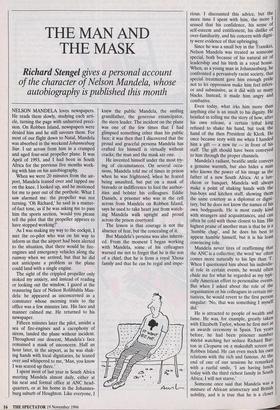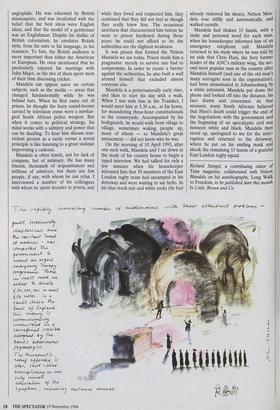THE MAN AND THE MASK
Richard Stengel gives a personal account
of the character of Nelson Mandela, whose autobiography is published this month
NELSON IVIANDELA loves newspapers. He reads them slowly, studying each arti- cle, turning the page with unhurried preci- sion. On Robben Island, newspapers were denied him and he still savours them. For most of our flight down to Natal, Mandela was absorbed in the weekend Johannesburg Star. I sat across from him in a cramped and aged four-seat propeller plane. It was April of 1993, and I had been in South Africa for the previous five months work- ing with him on his autobiography.
When we were 20 minutes from the air- port, Mandela leaned over and tapped me on the knee. I looked up, and he motioned for me to peer out of the porthole. What I saw alarmed me: the propeller was not turning. 'Oh Richard,' he said in a matter- of-fact tone, as if he was asking me to pass him the sports section, 'would you please tell the pilot that the propeller appears to have stopped working?'
As I was making my way to the cockpit, I met the co-pilot who was on his way to inform us that the airport had been alerted to the situation, that there would be fire- engines and emergency vehicles along the runway when we arrived, but that he did not anticipate a problem as the plane could land with a single engine.
The sight of the crippled propeller only stoked my anxiety, and instead of reading or looking out the window, I gazed at the reassuring face of Nelson Rolihlahla Man- dela: he appeared as unconcerned as a commuter whose morning train to the office was a few minutes late. His face and manner calmed me. He returned to his newspaper.
Fifteen minutes later the pilot, amidst a sea of fire-engines and a cacophony of sirens, landed the plane without incident. Throughout our descent, Mandela's face remained a mask of unconcern. Half an hour later, in the airport, as he was shak- ing hands with local dignitaries, he leaned over and whispered to me, 'Man, you know I was scared up there.'
I spent most of last year in South Africa meeting Mandela almost daily, either at his neat and formal office at ANC head- quarters, or at his home in the Johannes- burg suburb of Houghton. Like everyone, I knew the public Mandela, the smiling grandfather, the generous emancipator, the stern leader. The incident on the plane was one of the few times that I had glimpsed something other than his public face; it was then that I discovered that the proud and graceful persona Mandela has crafted for himself is virtually without cracks; the man and the mask are one.
He invented himself under the most try- ing of circumstances. On several occa- sions, Mandela told me of times in prison when he was frightened, when he feared being assaulted, but put on a mask of bravado or indifference to fool the author- ities and bolster his colleagues. Eddie Daniels, a prisoner who was in the cell across from Mandela on Robben Island, says he used to take heart just from watch- ing Mandela walk upright and proud across the prison courtyard.
The lesson is that courage is not the absence of fear, but the concealing of it.
But Mandela's persona was also inherit- ed. From the moment I began working with Mandela, some of his colleagues warned me not to forget that he is the son of a chief, that he is from a royal Xhosa family and that he can be regal and impe- rious. I discounted this advice, but the more time I spent with him, the more I sensed that his confidence, his sense of self-esteem and entitlement, his dislike of over-familiarity, and his concern with digni- ty were evidence of that upbringing. Since he was a small boy in the Transkei, Nelson Mandela was treated as someone special, both because of his natural air of leadership and his birth in a royal house. When, as a young man in Johannesburg, he confronted a pervasively racist society, that special treatment gave him enough pride not to let oppression make him feel inferi- or and submissive, as it did with so many blacks. Instead, it made him angry and combative.
Even today, what irks him more than anything else is an insult to his dignity. He bristled in telling me the story of how, after his own release, a certain tribal king refused to shake his hand, but took the hand of the then President de Klerk. He once became testy with me when I handed him a gift — a new tie — in front of his staff. The gift should have been conveyed to him through the proper channels.
Mandela's radiant, beatific smile conveys a genuine warmth, but also hides a man who knows the power of his image as the father of a new South Africa. At a lun- cheon or banquet, Mandela will always make a point of shaking hands with the bus-boys and kitchen staff, showing them the same courtesy as a diplomat or digni- tary, but he does not know the names of his own bodyguards. He is most easily kind with strangers and acquaintances, and can often be cold with those closest to him. His highest praise of another man is that he is a `humble chap', and he does his best to appear humble himself, but it is his least convincing role.
Mandela never tires of reaffirming that the ANC is a collective; the word 'we' often comes more naturally to his lips than `I'• When I questioned him about his individu- al role in certain events, he would often chide me for what he regarded as my typi- cally American effort to personalise events. But when I asked about the role of the organisation or his colleagues in certain ini- tiatives, he would revert to the first person singular: `No, that was something I myself did.'
He is attracted to people of wealth and fame. He was, for example, greatly taken with Elizabeth Taylor, whom he first met at an awards ceremony in Spain. Ten years before, he had been prisoner number 466/64 watching her seduce Richard Bur- ton in Cleopatra on a makeshift screen on Robben Island. He can even mock his own relations with the rich and famous. At the end of one of our sessions he remarked with a rueful smile, 'I am having lunch today with the third richest family in South Africa; I will not starve.'
Someone once said that Mandela was a mixture of African aristocracy and British nobility, and it is true that he is a closet anglophile. He was educated by British missionaries, and was inculcated with the belief that the best ideas were English ideas, and that the model of a gentleman was an Englishman. Despite his dislike of British colonialism, he emulates British style, from his suits to his language, to his manners. To him, the British audience is more important than either the American or European. He once mentioned that he particularly enjoyed his meetings with John Major, as the two of them spent most of their time discussing cricket. Mandela can appear naive on certain subjects, such as the media — areas that changed fundamentally while he was behind bars. When he first came out of prison, he thought the furry sound-booms carried by television crews were a newfan- gled South African police weapon. But when it comes to political strategy, his mind works with a subtlety and power that can be dazzling. To hear him discuss non- violent protest as a tactic versus a moral principle is like listening to a great violinist improvising a cadenza. Mandela is often lonely, not for lack of company, but of intimacy. He has many friends, thousands of acquaintances and millions of admirers, but there are few people, if any, with whom he can relax. I interviewed a number of his colleagues with whom he spent decades in prison, and while they loved and respected him, they confessed that they did not feel as though they really knew him. The occasional aloofness that characterised him before he went to prison hardened during those years: he could not afford to let the authorities see the slightest weakness.
It was prison that formed the Nelson Mandela we see today. Prison made him a pragmatist: merely to survive one had to compromise. In order to create a barrier against the authorities, he also built a wall around himself that excluded almost everyone else.
Mandela is a preternaturally early riser, and likes to start his day with a walk. When I was with him in the Transkei, I would meet him at 5.30 a.m., at his home, for meandering three-hour constitutionals in the countryside. Accompanied by his bodyguards, he would walk from village to village, sometimes waking people up, many of whom — to Mandela's great amusement — did not know who he was.
On the morning of 10 April 1993, after one such walk, Mandela and I sat down in the study of his country house to begin a taped interview. We had talked for only a few minutes when his housekeeper informed him that 30 members of the East London rugby team had encamped in his driveway and were waiting to say hello. In his blue track-suit and white socks (he had already removed his shoes), Nelson Man- dela rose stiffly and automatically, and walked outside.
Mandela had shaken 15 hands, with a smile and personal word for each man, when his housekeeper informed him of an emergency telephone call. Mandela returned to his study where he was told by an aide that Chris Hani, the fiery former leader of the ANC's military wing, the sec- ond most popular man in the country after Mandela himself (and one of the old man's many surrogate sons in the organisation), had been assassinated in Johannesburg by a white extremist. Mandela put down the phone and looked off into the distance, his face drawn and concerned. At that moment, many South Africans believed that Hani's death could trigger the end of the negotiations with the government and the beginning of an apocalyptic civil war between white and black. Mandela then stood up, apologised to me for the inter- ruption and returned to the driveway, where he put on his smiling mask and shook the remaining 15 hands of a grateful East London rugby squad.
Richard Stengel, a contributing editor of Time magazine, collaborated with Nelson Mandela on his autobiography, Long Walk to Freedom, to be published later this month by Little, Brown and Co.



















































































 Previous page
Previous page